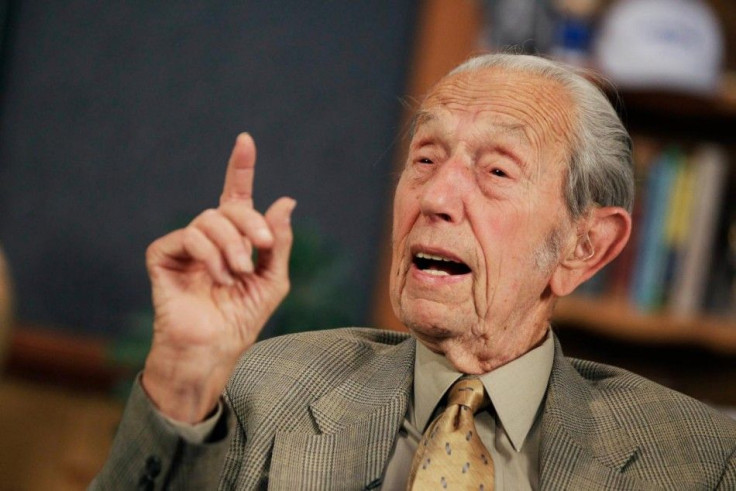Harold Camping after Failed October 21 Doomsday: Will He Give Up?

Harold Camping is wrong again about his Doomsday prediction, but by this time around he has already been famously defined as a false prophet by his fellow Christians.
With his third prediction of the world's end on Oct. 21 proven to be wrong, Camping might have experienced Doomsday of his own - the 90-year-old preacher slipped away from the media's reach along with his Family Radio workers.
I'm sorry to disappoint you, but we at Family Radio have been directed to not talk to the media or the press, Camping's daughter Susan Espinoza told The Associated Press on Friday.
Even before the supposed Doomsday, Camping did not comment on this true and final day of judgment.
We're not having a conversation, Camping told Reuters. There's nothing to report here.
In his book published in 1992, Camping had said the world would end between September 15 and 17, 1994. When nothing happened, he said the calculation was a mistake, and recalculated the number which then pointed to May 21, 2011. The last prediction in May, as you may recall, stirred a worldwide buzz and, following its failure, criticism. When he was proven wrong again, Camping hid himself from the public eye, and another miscalculation made him say that the supposed rapture was to happen five months later.
Ironically, Camping's conduct categorizes him as a false prophet in the Bible, the very book he used to calculate the Doomsdays.
The more confident Camping is about his prediction, the more embarrassment he brings upon himself by this self contradiction.
The Bible says that if someone makes a prophecy that doesn't come true he is to be considered a false prophet and stoned to death, Robert Jeffress, senior pastor of Dallas First Baptist Church, told The Christian Post. Harold Camping has made at least three false prophecies about the day of the Rapture. And so, if he's not going to be stoned to death, he at least needs to be muzzled.
When May 21 prediction was proven wrong again, Camping was reportedly hospitalized for a stroke before coming up with the new date, Oct. 21.
Family Radio has been broadcasting a message to supporters on Saturday, a day after Camping's third prediction, encouraging them to keep making donations.
The network, which grew to be a $120 million empire owning radio stations in 50 countries around the world. However, according to the message, the nonprofit organization worth $72 million in 2009 may be experiencing financial difficulties.
I trust that you too will pray for us often that we can minister in many ways. That God will provide wisdom to those of leadership and that we continue to minister to you, and to teach God's word daily. Please pray for us and pray about continuing to support this totally listener-sponsored Christian radio network, said the radio announcer.
We have a great need for daily operating funds. Without your generous support at this time we might be forced to face some very important decisions. I trust those of you who enjoy some of our programming daily will be able to share generously in the months ahead.
This time around, Family Radio may not survive the embarrassment caused by its founder. The renewed prediction did not attract as much attention as the last one in May.
When Camping and his followers loudly publicized the end of the world five months ago, donation to Family Radio swell, as they spent millions of dollars on thousands of billboards and caravans.
As for Camping himself, selling his TV and radio stations, he used the money to put out a $100-million worldwide advertising campaign. All the money and time were invested into the prediction of May 21 Doomsday only to find himself and all others still alive on earth.
After three non-events, it is highly unlikely for anyone to still put faith in whatever Camping has to say about the world's end.
However, as many may be curious, what should we expect from Harold Camping and his followers? While we may never find out Camping's whereabouts now that he has quietly disappeared, a psychological analysis may indicate what to expect from the modern-day false prophet.
There are simply three options: justify, blame or deny the contradiction. Here is the deal.
Leon Festinger, a psychologist, came up with a theory about the aftermath of cults that proclaim the end time prophecy. Observing that when doomsday predictions proved mistaken, Festinger discovered that the fervor of the followers actually increased and they would proselytize aggressively, resulting in a rapid growth of the movement.
Festinger called the escalated zeal cognitive dissonance, which occurs when someone clings to two inconsistent opinions or beliefs simultaneously. Just as an alcoholic knows it is unhealthy to be intoxicated and yet continues drinking, cognitive dissonance occurs in the religious realm as well. It produces discomfort and pressure to reduce or eliminate the contradiction. In trying to reject one factor of the dissonance, a drinker could choose to stop drinking. But obviously it is not that easy to do. Likewise, for the Doomsday believers to simply admit their error is not so easy. In the desperate mind they can't afford to doubt but only to believe.
A great alternative mechanism to release the discomfort and pressure is to come up with a reasonable solution, like quitting drinking next year, or reducing the amount. Just as Camping did in the past, coming up with a new calculation or revelation is a high likelihood.
So don't be surprised even if Camping comes up with an up-DATE, and some remainder of his followers stand up from the shame and disappointment.
There is no word yet from the 90-year-old evangelist, but he could one day appear again, with a new calculation, just to see how faithful he is as a Doomsday prophet, whether false or not.
© Copyright IBTimes 2024. All rights reserved.





















